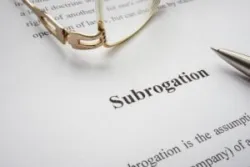
A subrogation letter is a formal notice sent by an insurance company or other entity that has paid for your medical expenses or other damages related to an accident before you settled or won in court.
The letter informs you of their right to seek reimbursement from your settlement, as well as what they paid you already and how much they seek to recover. Subrogation is a legal right that allows insurers to recover their costs from the at-fault party.
These letters are a normal part of the settlement process, but they can be confusing and scary. If you used a Los Angeles personal injury lawyer for your claim, they can help you understand if a subrogation letter is legitimate and how to respond.
How Does Subrogation Work?
Here is a practical example of a subrogation. Imagine you were harmed in a car accident, and you had to pay $10,000 for medical treatment. You paid $2,000 for your deductible, and $8,000 was paid by your health insurance.
Later, you file an insurance claim against the at-fault driver and settle for $50,000 in damage. Your health insurer may send you a subrogation letter requesting payment for the $8,000 they have already paid. It is a way for them to claim their share of compensation from whoever caused your accident.
You are still compensated for your total damages, but because you received some money upfront from your insurer, they will want to get paid back through the settlement. The letter is their formal claim for that money.
Why Might I Receive a Subrogation Letter?
You may receive a subrogation letter if:
- Your health insurance covered medical expenses related to your accident.
- Your auto insurance paid for damages under your collision coverage.
- Workers’ compensation covered your injuries from a work-related accident.
- Medicare or Medicaid paid for your medical treatment.
The letter indicates that the entity that paid these expenses intends to recover their costs from any settlement you receive.
How Does Subrogation Affect My Personal Injury Claim?
Subrogation can have significant implications for your personal injury claim:
- Settlement reduction: The amount you owe through subrogation may reduce your final settlement amount
- Negotiation impact: Knowing about subrogation claims helps with negotiating a fair settlement amount.
- Legal obligations: You may be legally required to repay certain benefits from your settlement.
Your lawyer will want to know if your insurance covered any of your costs before the settlement so they can add them to your total compensation. That way, if you get a subrogation letter, your settlement will have enough money to cover their legal claim.
What Should I Do if I Receive a Subrogation Letter?
If you receive a subrogation letter, take these steps:
- Don’t ignore it: Subrogation claims are legally valid and require attention.
- Review the details: Ensure all listed expenses are accurate and related to your accident.
- Keep records: File the letter with your other accident-related documents.
- Inform your attorney: If you have legal representation, notify them immediately.
- Don’t pay immediately: Wait until your claim is settled before addressing the subrogation claim.
Receiving a subrogation letter doesn’t mean you have to pay right away. It’s a notice of the insurer’s intent to seek reimbursement from your potential settlement.
Can Subrogation Claims Be Negotiated?
Yes, subrogation claims can often be negotiated so you can get more money from your settlement. Here’s what you should know:
- Reduction possibilities: In many cases, the subrogation amount can be reduced through negotiation.
- Made whole doctrine: This legal principle may limit the insurer’s recovery if your settlement doesn’t fully compensate you.
- Professional negotiation: An experienced attorney can often negotiate more effectively with insurance companies.
At Omega Law Group, we have experience negotiating subrogation claims to maximize our clients’ recoveries. California law has specific provisions regarding subrogation in personal injury cases:
- Notice requirement: Insurers must provide timely notice of their subrogation claim.
- Common fund doctrine: This may require the insurer to contribute to your attorney’s fees if their recovery was made possible by your lawsuit.
- Limitations: Some benefits, like Medi-Cal, have specific rules governing subrogation.
How Can Omega Law Group Help With Subrogation Issues?
At Omega Law Group, we’re equipped to handle all aspects of subrogation in your personal injury case:
- Letter review: We’ll carefully examine any subrogation letters you receive.
- Claim verification: Our team will ensure all subrogation claims are valid and accurate.
- Negotiation: We’ll work to reduce subrogation amounts whenever possible.
- Legal protection: We’ll ensure your rights are protected throughout the subrogation process.
- Settlement maximization: We aim to maximize your net recovery.
With our modern approach to law and decades of experience, we’re well-prepared to handle the intricacies of subrogation on your behalf.
Deal With a Subrogation Letter With Confidence
Understanding subrogation letters and their impact on your personal injury claim is crucial for a fair settlement. Omega Law Group can help you if you’re unsure about a subrogation claim or wish to challenge one.
Don’t let subrogation concerns add to your stress after an accident. Contact Omega Law Group today for a consultation.

